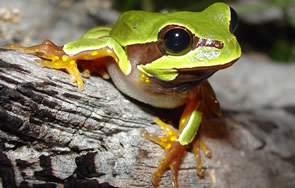
Hyla andersonii
Photo by Aubrey Heupel
Listed: N.C. Natural Heritage Program, Significantly Rare
Description: Named for the New Jersey Pine Barrens, the Pine Barrens treefrog is considered by some to be the most beautiful frog in the United States. It is a medium-sized green treefrog with a white-bordered lavender stripe along each side of its body and brilliant orange on the underside of each leg.
Habitats and Habits: Pine Barrens treefrogs are found in the pine forests and sandhills of south-central North Carolina. They are nocturnal and seldom seen, presumably spending their time in shrubs and trees. Most sightings occur during their breeding season. Breeding habitats include Carolina bays, pocosins (shrub bogs), spring-fed pools and bogs adjacent to pine forests. Females attach eggs singly or in small clusters to Sphagnum moss, or lay them on the bottom of the wetland. After hatching, tadpoles complete metamorphosis in seven to 11 weeks.
Call: Pine Barrens treefrogs call from April to September. Males call from the ground or from shrubs or other vegetation near the water’s surface. Their call, which sounds like a nasal “honk” or “quonk,” is quickly repeated 10 to 20 times at infrequent intervals.
Frog Fact: Pine Barrens treefrogs have a limited distribution in North Carolina, and populations are thought to be declining due to habitat destruction and degradation.
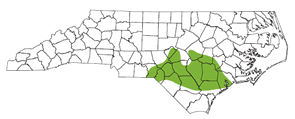
The shaded region represents the range of the Pine Barrens treefrog in North Carolina.
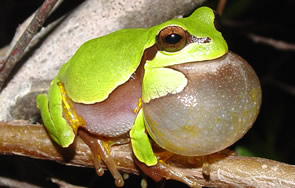
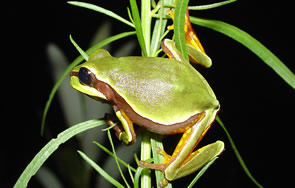
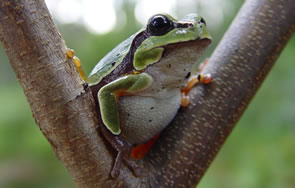
Photo by Aubrey Heupel
Photo by Aubrey Heupel
Photo by Mark Danaher
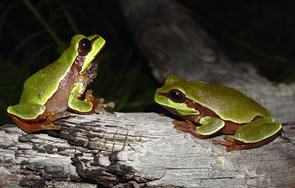

Photo by Aubrey Heupel
This website created by: Grant Connette and Evan Eskew.
For comments or questions contact M. Dorcas: midorcas@davidson.edu.
M. Dorcas homepage: http://bio.davidson.edu/dorcas
Davidson College, Davidson, North Carolina 28035-1719.
Text and maps from: Dorcas, M. E., S. J. Price, J. C Beane, and S. S. Cross. 2007. The Frogs and Toads of North Carolina. North Carolina Wildlife Resources Commission, Raleigh, NC. – Copyright by Michael E. Dorcas
Call provided by E. Pierson Hill.
Partial Funding for this website provided by a Associate Colleges of the South, National Science Foundation, and Duke Energy.
